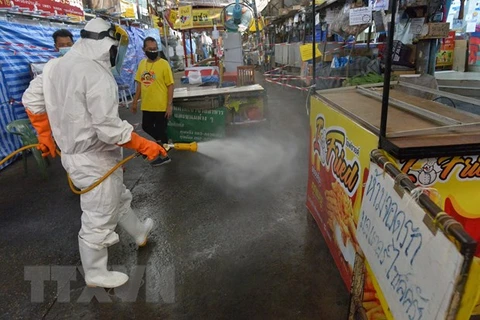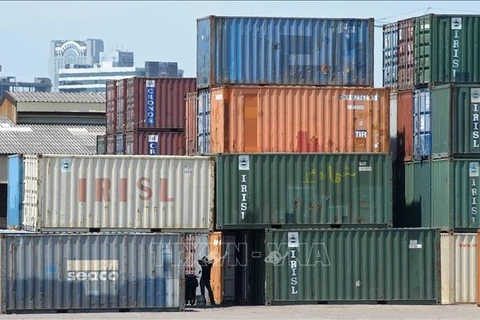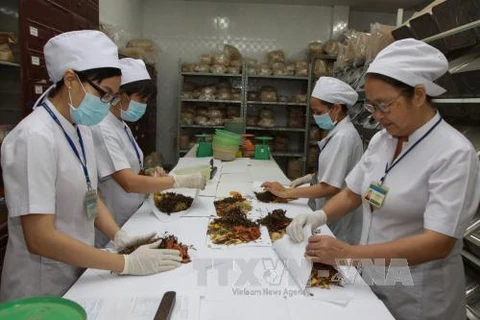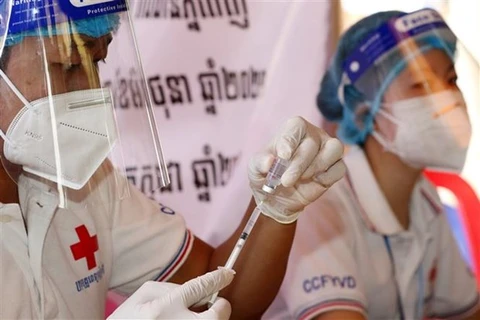Bangkok (VNA) – Thai Prime Minister Prayut Chan-o-cha has ordered the formation of a committee to study the use of green chiretta (Andrographis paniculata) extracts to treat COVID-19 patients with mild symptoms.
Deputy Prime Minister and Public Health Minister Anutin Charnvirakul was appointed head of the committee, local media reported.
It will coordinate studies on the safety and efficacy of green chiretta extracts on COVID-19 patients, as well as draft a strategic plan to promote Thai traditional medicine in general.
The decision was taken in response to a proposal from Justice Minister Somsak Thepsutin, who urged the government to scale up the use of traditional medicine on COVID-19 patients with mild symptoms. This comes amid a vaccine shortage which has led to criticism for the government.
His proposal came with evidence showing the Department of Corrections' success in treating 12,376 inmates who contracted COVID-19 with green chiretta extracts.
Of this number, 5,045 inmates were in Chiang Mai Central Prison, 2,100 in Nonthaburi Provincial Prison and 5,231 in Bang Kwang Central Prison also in Nonthaburi, said Somsak.
Before prescribing the herbal medicine to the infected inmates, Somsak said he had studied information by the Department of Thai Traditional and Alternative Medicine, which recommended a dosage of 180mg of andrographolides from green chiretta for five consecutive days to patients with mild symptoms.
Citing the same research, the minister said each rai (0.16 hectare) of land can yield up to 600kg of green chirettas, which can be turned into roughly 375,000 herbal extract capsules, he said.
A total of 3.1 billion such capsules will be needed to cover all Thais, which means 8,400 rai of land will need to be planted with the herb, he said.
Due to its medical benefits, green chiretta has become a cash crop which is now in high demand in the export sector, he said, adding that the medicinal herb costs about 450 baht (13.7 USD) per kg. The Department of Corrections now plans to produce about 50 million capsules of the herbal medicine in the next four months, which it aims to prescribe to about 50 percent of the prison population, he said./.
Deputy Prime Minister and Public Health Minister Anutin Charnvirakul was appointed head of the committee, local media reported.
It will coordinate studies on the safety and efficacy of green chiretta extracts on COVID-19 patients, as well as draft a strategic plan to promote Thai traditional medicine in general.
The decision was taken in response to a proposal from Justice Minister Somsak Thepsutin, who urged the government to scale up the use of traditional medicine on COVID-19 patients with mild symptoms. This comes amid a vaccine shortage which has led to criticism for the government.
His proposal came with evidence showing the Department of Corrections' success in treating 12,376 inmates who contracted COVID-19 with green chiretta extracts.
Of this number, 5,045 inmates were in Chiang Mai Central Prison, 2,100 in Nonthaburi Provincial Prison and 5,231 in Bang Kwang Central Prison also in Nonthaburi, said Somsak.
Before prescribing the herbal medicine to the infected inmates, Somsak said he had studied information by the Department of Thai Traditional and Alternative Medicine, which recommended a dosage of 180mg of andrographolides from green chiretta for five consecutive days to patients with mild symptoms.
Citing the same research, the minister said each rai (0.16 hectare) of land can yield up to 600kg of green chirettas, which can be turned into roughly 375,000 herbal extract capsules, he said.
A total of 3.1 billion such capsules will be needed to cover all Thais, which means 8,400 rai of land will need to be planted with the herb, he said.
Due to its medical benefits, green chiretta has become a cash crop which is now in high demand in the export sector, he said, adding that the medicinal herb costs about 450 baht (13.7 USD) per kg. The Department of Corrections now plans to produce about 50 million capsules of the herbal medicine in the next four months, which it aims to prescribe to about 50 percent of the prison population, he said./.
VNA
























